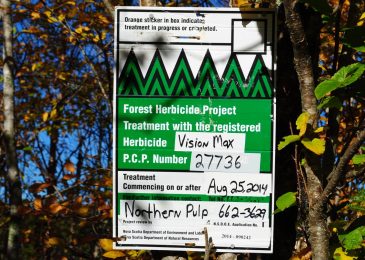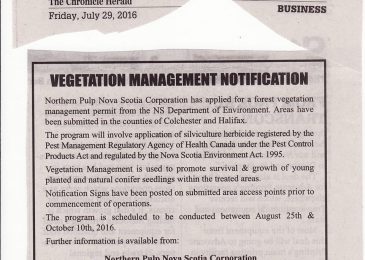KJIPUKTUK (Halifax) – Northern Pulp’s application to spray large swaths of woodland in Colchester and HRM with a herbicide containing glyphosate is causing alarm among people in the area concerned about their health.
We have the second most diverse forests in Canada, and spraying is out of line with the ecology of the forest.
The glyphosate kills hardwood growth, eliminating a competitor of the softwood that Northern Pulp focuses on.

As Francis Campbell reports in today’s Local Xpress there are good reasons to worry about possible exposure to glyphosate, a chemical that the World Health Organization has classified as a probable human carcinogen.
But there is an additional reason to be concerned about Northern Pulp’s intended spraying program, says Matt Miller, forestry program coordinator with the Ecology Action Centre.
“That type of conversion virtually eliminates hardwood from a stand, which reduces the resilience of that forest,” says Miller.
“Northern Pulp is interested in only one commodity form of the forest, which is a softwood forest to make two-by-fours and pulp. That particular focus comes at the expense of ecosystem diversity and stability,” says Miller. “We have the second most diverse forests in Canada, and spraying is out of line with the ecology of the forest.”

This ecological diversity matters, and not just because naturalists enjoy a variety of birds, bees and wildflowers during their sunday hike.
“You don’t want to put all your savings in one stock, because if that stock crashes you are in trouble. It is no different in the forest. When you think about things like insects and pest outbreaks, which with climate change will only get more complex, having a diverse forest will help safeguard against those threats,” says Miller.
It doesn’t have to be this way, says Miller, even if softwood is your focus.
“Port Hawkesbury Paper has been working towards eliminating the use of herbicide as part of their FSC certification. But it is a more expensive and a bit less efficient. Which also means that there are more jobs per hectare associated with that approach,” says Miller.
“Much of the pain we have been feeling here in Nova Scotia’s forest industry is because it is mostly reliant on just a few products,” says Miller. “We should aim for a forest that will provide us with management flexibility in the future, instead of trying to manage it for an economic paradigm that really hasn’t worked in the last ten years.”
In 2010 the Department of Natural Resources (DNR) not only halted herbicide spraying on Crown Lands, it also stopped subsidizing private companies to execute their own herbicide spraying programs.
Rumours on Facebook and elsewhere suggest that such subsidies may be reinstated.
We asked DNR to comment, but have not yet received a response. We will update the story when we get that response.
See also: DNR drops acclaimed forestry certification program in Western Nova Scotia




Wrong decision to spray possible carcinogenic chemicals in NOVA SCOTIA . Also to interfere with the life of the forest animals and birds and ecosystem.We have know this for a long time and continue to make the same mistakes in our Forestry /Health Practices . Madeline Taylor R.N. MSW RSW a long time concerned person ,since 1976, about these issues..
Don’t think contacting your MP is going to help, NP has deep pockets and has its tentacles in multiple layers of government. I think that’s a better story than the glyphosate